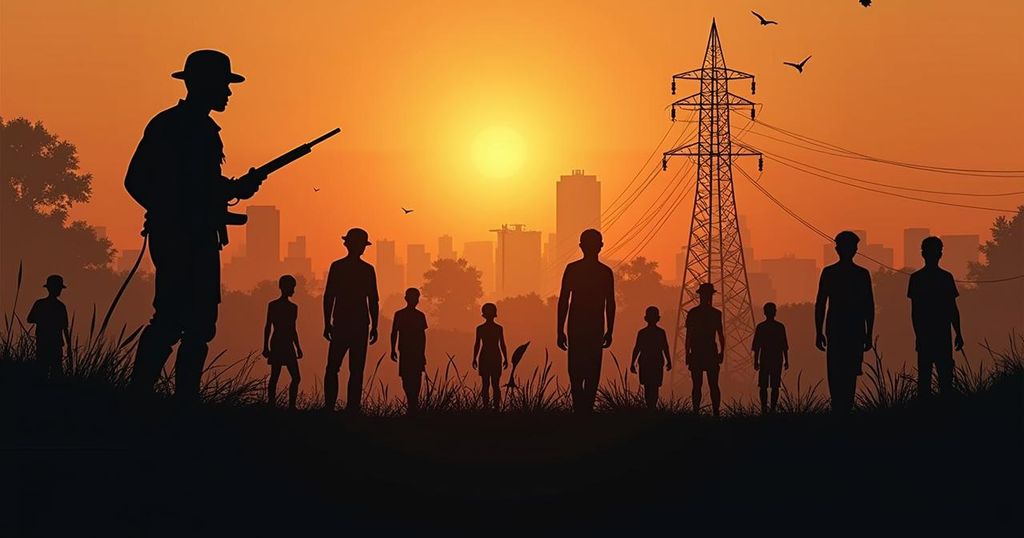U.N. Human Rights Council Discusses Worsening Human Rights Conditions in the DRC

The U.N. Human Rights Council has raised alarms about the deteriorating human rights situation in the Democratic Republic of the Congo, where armed group violence, sexual abuse, and attacks on civilians are escalating. U.N. officials have urged the global community to intervene, while the DRC government highlighted the destabilizing role of foreign actors, particularly Rwanda, in the ongoing conflict.
Recent discussions at the United Nations Human Rights Council in Geneva have highlighted a concerning deterioration in the human rights situation in the Democratic Republic of the Congo (DRC). U.N. High Commissioner for Human Rights, Volker Türk, opened the dialogue by urging the international community to recognize the plight of Congolese civilians who are suffering from escalating violence driven by armed groups, particularly in the eastern regions of the country. He emphasized the intersection of violence with regional and international interests, exploitative practices, and a fragile rule of law. The surge in human rights abuses includes deadly assaults on civilians and critical infrastructure, including educational and health facilities. The alarming prevalence of sexual violence, including the enslavement of women and girls by armed groups, underscores the gravity of the situation. Türk noted, “The armed groups take people prisoners, subject women and girls to sexual slavery. Many of them have been killed after being raped. These cases, of course, have not all been reported. This is atrocious.” Furthermore, he acknowledged concerns regarding human rights violations committed by state security forces during military confrontations with armed factions and condemned the incitement of violence and discrimination that fuels the ongoing conflict. Türk called for influential nations to leverage their power to halt hostilities and articulated a clear stance opposing any external support for armed groups, particularly referencing alleged Rwandan backing of the M23 rebels operating in North Kivu. In response, DRC’s Minister of Human Rights, Chantal Shambu Mwavita, defended her government’s efforts to enhance human rights protections, attributing challenges to external factors contributing to the conflict. She urged the international community to impose targeted sanctions against Rwanda due to its alleged destabilizing activities in the region. The long-standing violence in eastern DRC is deeply intertwined with the illicit exploitation of the region’s natural resources. Despite Rwanda’s persistent denials of aiding the M23, it remains a contentious topic in diplomatic dialogues. Rwanda’s Foreign Minister voiced concerns regarding the humanitarian situation and emphasized the need for dialogue and peaceful resolution, asserting, “No military solution can address the root causes of the conflict in eastern DRC.” As peacekeeping dynamics shift, the future presence of U.N. forces remains uncertain. Bintou Keita, the head of the U.N. mission in the DRC, outlined the alarming human rights landscape, detailing the extensive suffering experienced by civilians due to violent confrontations, prompting mass displacements toward urban centers. In summary, the DRC faces significant humanitarian challenges, including over 7.2 million internally displaced individuals and nearly 26 million suffering from acute hunger, exacerbated by persistent conflict and insecurity across its eastern provinces.
The Democratic Republic of the Congo has experienced decades of turmoil, characterized by armed conflicts and humanitarian crises. The situation is particularly acute in the eastern regions, where various armed groups vie for control over rich natural resources, leading to widespread violence against civilians. The United Nations has consistently documented severe violations of human rights, including sexual violence and attacks against civilian infrastructure such as schools and hospitals. The complexity of the conflict is heightened by the involvement of external actors, notably Rwanda, which faces allegations of supporting rebel groups within the DRC. The international community is increasingly called upon to respond to these violations and to foster peace and stability in the region, especially as menacing developments continue.
The ongoing crisis in the Democratic Republic of the Congo represents a dire humanitarian situation exacerbated by armed conflict, regional interference, and escalating human rights abuses. The comprehensive appeal by U.N. representatives underscores the urgent need for international intervention and accountability to protect vulnerable populations. Conclusively, addressing the systemic issues surrounding human rights violations, alongside the apparent involvement of external forces, is essential for establishing lasting peace and security in the DRC.
Original Source: www.voanews.com








